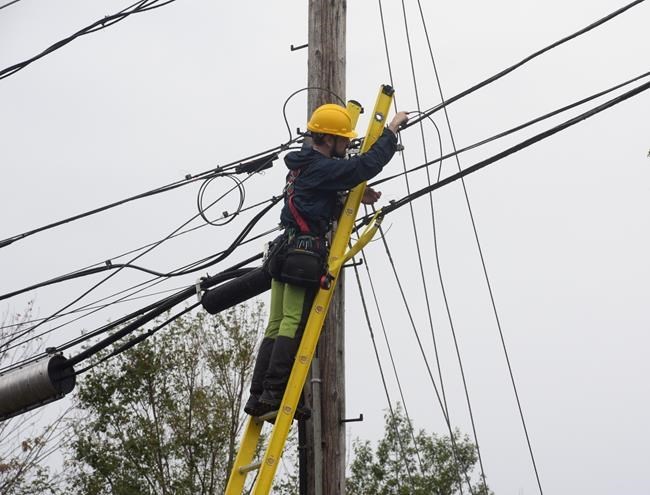HALIFAX — The CEO of Maritime Electric says budgets for Prince Edward Island's power grid should be increased to help the province better withstand the next major storm, after what critics are calling a "lost decade" of inaction.
Jason Roberts says the public utility asked the province's energy regulator to approve a rise in tree-cutting spending in an application submitted before post-tropical storm Fiona hit the Island on Sept. 24.
Downed trees and branches on the utility's power lines caused the majority of the widespread outages in P.E.I. after Fiona made landfall, Roberts said in an interview Monday.
"I would expect the more we can invest in vegetation management, the more beneficial it will be for outage management," he said.
In its application to the regulator, Maritime Electric proposed to double spending on tree cutting and trimming to between $4 million and $5 million annually. That application, however, also indicated that the amount being spent by the utility to control risks was lower per kilometre of distribution line than in neighbouring provinces and had fallen behind industry standards.
The firm's proposal last June to the regulator included some higher spending scenarios on tree management — up to $8 million annually — but the utility concluded that would be "too high" a cost for customers.
Asked if the damage from Fiona has led the company to reconsider a higher budget, Roberts replied, "As we head into further discussions with the regulator, it's probably something we're going to explore further, and we probably should explore further."
Roberts estimated that the proposed doubling of the tree-management budget would mean an increase in power rates of less than one per cent annually — about 0.8 per cent.
Asked about the possibility of putting some portions of the grid underground, Roberts said the cost of doing so is eight to 10 times higher than installing overhead wires, adding that there are better alternatives, such as tree cutting. "Our experience with Fiona, where there were no trees near our lines, it performed well."
Roberts said new substations are being constructed — composed of steel materials rather than wooden poles — but he said the utility doesn't plan to replace most wooden poles across the Island because they are sufficient in most situations.
The utility has faced criticisms from the Opposition Green Party for not having had a better restoration plan that gave priority to vulnerable citizens. Seven provincially operated seniors residences waited about two weeks for power restoration during the outage from Fiona.
Roberts said the utility defines "critical customers" as citizens who rely on oxygen supplies, "as well as seniors and schools." However, he said that the further away an electricity customer is from the nearest functioning source of electricity, the more time is needed to restore power.
"What it boils down to is where you are in the system," Roberts said. "The further you are away from a substation or the source of generation … the more likelihood there is more damage between you and the source of supply, and the longer it (restoration) can take."
He said that in the future, the managers of properties in which vulnerable people are located must ensure there is backup generation on-site, whether that backup is from batteries or generators.
Green Party Leader Peter Bevan-Baker said in an email that the utility, a subsidiary of Fortis Inc., should have started to move on strengthening the grid sooner. He noted that a 2012 Conference Board of Canada study warned Canadian utilities that $350 billion would need to be spent simply to maintain the existing reliability of the national grid.Â
"Yet today, Maritime Electric, after a wasted decade of inaction, still spends considerably less per kilometre than other Atlantic utilities on things like vegetation control," Bevan-Baker said.
"Fiona has proven the decisions by Maritime Electric to ignore the warnings is costing the utility — and ultimately Islanders — millions of dollars. This is a short-sighted and unacceptable approach. Maritime Electric must be far more proactive in its spending to protect the Island electrical grid."
This report by The Canadian Press was first published Oct. 18, 2022.
Michael Tutton, The Canadian Press




